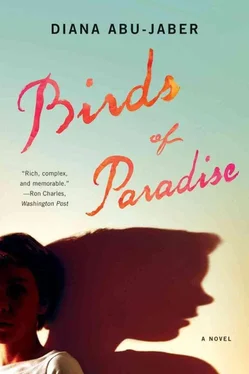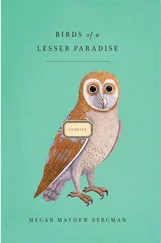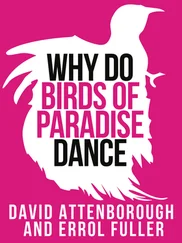When Brian finally emerges with his hurricane-preparedness items, the sky over the lot glistens, brilliantly clear, a depthless turquoise. Pre-storm sky. He is unloading the bags from the car into the garage when there’s a rap on the garage door. He opens the door to a short man holding two paper bags. “I knock and knock, but no answer,” the man says stoically. “I almost give up. Then I see you drive in.” Brian leads the deliveryman through the garage door into the house. Uncertain where the fruits go, he has him leave the bags on a kitchen counter. There are big covered ceramic bowls on another counter, but no sign of Avis, not even the scent of things baking: an unnerving emptiness in the air. “These are starfruit, lychees, and blood orange in the jars,” the man is saying pointedly, as if he doesn’t quite trust his goods with Brian. “Where is the Cuban girl? She don’t work here no more? The boss answer the door last week. Now you.” He seems openly mournful yet resigned to this turn of events. Brian studies the narrow tilt of his eyes, his expression evocative of years of patiently borne suffering and disappointment. Where has Nina gone? Brian realizes he hasn’t heard Avis mention her assistant or seen her in weeks. How unfamiliar his wife’s daytime life has become — a separate world, moving in an orbit barely adjacent to his.
After the delivery van pulls away, Brian walks through the house, looking for Avis. The bed is neatly made, all clothes are folded and put away. Back in the kitchen, he notices the dough seems to be outgrowing the ceramic bowls, strips, soft and pale as human bellies visible beneath each tea towel. A murmuring reaches him through the rear kitchen window. He peers through a dappled film of water spots to the backyard, its border of invasive bamboo and a messy thin palm he’s been meaning to clear out for twenty years. He goes through the French doors, uncertain as to why he’s moving so quietly; for some reason, his breath is knotted, caught in the top of his chest. Squatting slightly, he’s able to peer through openings in the leaves where he beholds his wife sitting on the grass beside a young girl. He watches Avis’s profile as she talks to the girl: they appear to be sorting some kind of weeds as they talk. He notices the dark bristle of Avis’s hair: the girl’s skin is a luminous coffee color, her back and neck upright. She stands and stretches and he realizes she’s older than he’d thought, possibly the same age as his wife. A few feet away, the black bird purrs and babbles quietly. Brian feels cold with doubt, bafflement. When he was a child, his mother took him to a fortune-teller at a street fair. The woman fanned cards across a table. Those images: a hanged man, a woman on a throne, a fool wandering off a cliff, called up the same immutable feelings he has now, watching the women together. He feels a kind of terrible idea taking hold of him: that the reason he’s started to act a little crazily is because, over the past days, he has sensed his family leaving him. He’d thought he was the one who made the decisions. But first the children went off and now, here is his wife in a scene of such utter contentment he feels he is looking into a future world, twenty years after his death.
BRIAN LEAVES HIS HOUSE in a state of ignominy. There are things to be done, he tells himself. In the past, whenever he’s felt beset by nameless promptings and anxieties, he’s always been able to hide in his work. Work rescued him and Avis both when Felice left. They submitted to hard labor: there seemed a genuine sanity in it. He lets his fingers ripple along the edges of the steering wheel, noting a greenish-gray haze at the edge of the sky. Brian picks up the phone. When Javier answers, he says abruptly, “Talk to me, man — that Steele Building — I’ve been thinking about it.”
“Brian?”
Brian detects a flicker of sound in the background — a feminine voice? “Jesus, Jav, where are you? Are you alone or what?”
“Dude, what’s your problem? You’re the one I’m worried about.”
“Worried? Why? Just because I’m going to put my goddamn house and my life savings on the line?”
“Listen, man, breathe — everything is fine — it’s perfect, right?” Now Javier’s voice is placating. “But I think maybe — look, we better slow things down. This isn’t the best time right now.”
Brian stares at the street. It occurs to him that he is, perhaps, losing his grip. His voice is half strangled. “Is Parkhurst gonna know about the Steele Building?”
“No, man, he doesn’t know nothing. He’s out of it. All he can think about right now is his Topaz deal.”
For some reason, Javier’s words make him want to weep or punch the steering wheel. “The Topaz Building. That thing.”
“Buddy, hey, we need to talk. Now isn’t the best time, though.”
“You already said that. But the other day you said it was a beautiful life. So I’ve decided. I want to do it. I want in. Let’s make a billion.”
“That’s good, Brian. That’s really good.” But there is something taut, almost compressed, in Javier’s voice. “Just, relax yourself, all right? Todo es fácil . I’ve gotta go now, okay? But hang on — we’ll talk very soon. For now, be easy. You do that for me, buddy? Just be easy.”
HE TAKES BRICKELL, his usual route — joggers, bicyclists, green avenues, new cars, vertiginous high-rises on all sides. But it’s midafternoon now and the light is all wrong: he’s missing from his life and no one has noticed. When he approaches the turnoff to the Ekers Building, he drives smoothly past. Easy. He’ll show him easy. He feels buoyant: he lowers the window and lets the air flood in: it smells like salt. Almost immediately, he hits lights and downtown traffic and he rolls the window back up. He has to jog to the east to skirt a construction site, trucks piled with plaster and lumber rumbling past in clouds of white dust. The entire city seems to vibrate with the roar of the cranes, as if its very core is being disemboweled. Brian stares at light skittering through the planks fencing off a work site and thinks of his son again: The wealthy need homes, too, he argues silently. But then he is haunted by some sense of revulsion: a soul rot.
Brian creeps through the city blocks then gets on to First. He rarely ventures this far north, past the Design District, its narrow wasteland of expensive furniture and home decor boutiques. But on First, the city reveals itself — a mess of check-cashing and pawnshops, Latin bakeries, and stunned, displaced tourists milling around. There are placards on a number of crumbling foundations, announcing, The Future Site of … Developed by … Everything is either falling apart or under construction. Even the people look different — darker skin tones, hair beaded, nails long and decorative, the cars dustier, rearview mirrors festooned with prayer beads, baby shoes, dice; there are dashboard saints and Virgins of Guadalupe, Cuban flags, flags of Colombia, Haiti, El Salvador, Lebanon. He makes a decision: he still doesn’t know exactly where the Steele Building is, but he does have the address for Parkhurst’s Blue Topaz. At the light on Northeast Fifty-fourth, he takes a left, following directions included in a folder from a commission hearing. It’s a grimy, working-class city street with hand-lettered signs for local businesses: Gonaïves Car Wash, Chez Italienne Fried Chicken, Bonjour Travel, the battered Église Haïtienne, every window covered with bars and scrolls of ironwork, metal dumpsters covered with the sort of graffiti that looks like vicious slashes, rows of rusted metal spear fencing, sailing plastic bags, and weed-riddled torn-up lots. At the corner, pulled up beside King Stable Bar-B-Q Lounge, its sign faded to near-invisibility, he makes a right, passing a mural of Martin Luther King Jr. and Bob Marley and above them in sky-blue paint, God Bless the United States of America .
Читать дальше












